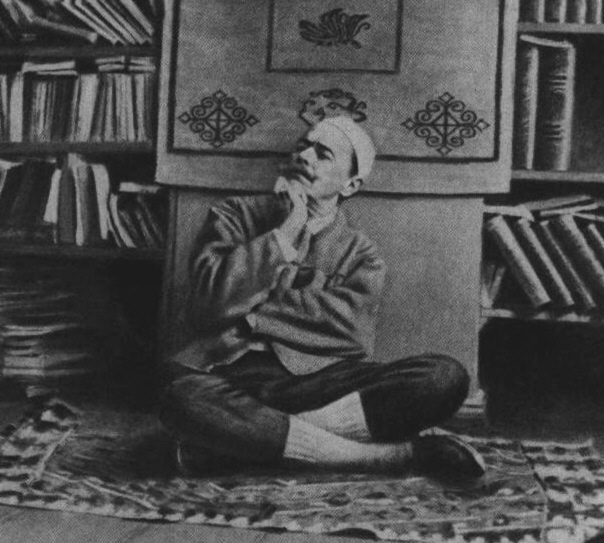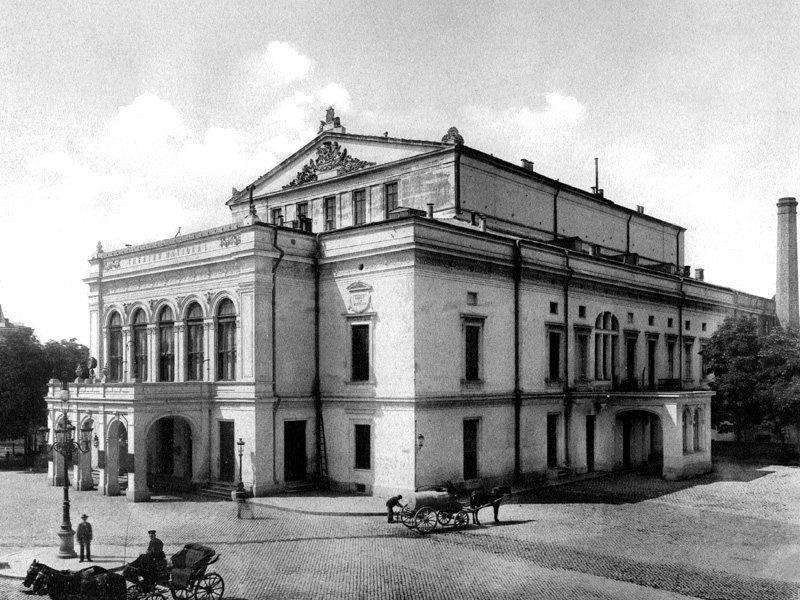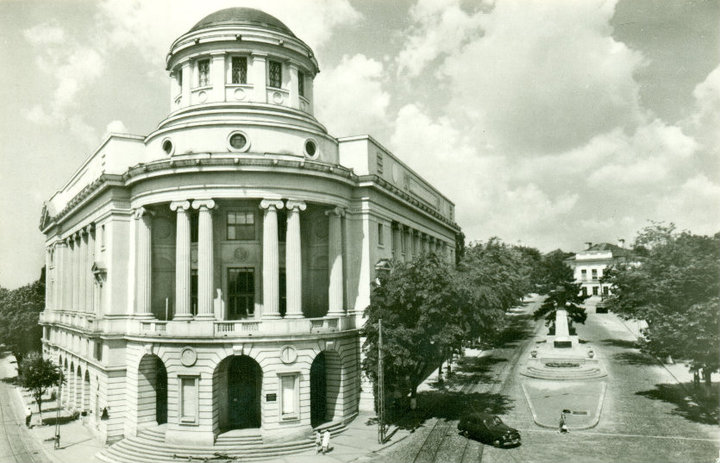|
Mihail Săulescu
Mihail Săulescu (23 February 1888 – 30 September(?), 1916) was a Romanian poet and playwright. Born in Bucharest, he was the fourth child (out of seventeen, of whom nine survived) born to Captain Nicolae Săulescu (known as the Romanian Army's official painter) and his wife Ecaterina (''née'' Gaist). From 1898 to 1903, he studied at Saint Sava and Matei Basarab high schools in his native city. Săulescu then entered the Conservatory of Dramatic Art, quitting in 1904 after his first year. Leaving Bucharest, he worked as a teacher in Gorj County and a substitute in Posada, Prahova County in 1908. In 1911, he was an editor at '' Luceafărul'' magazine in Sibiu, then a part of Austria-Hungary. After returning to the Romanian capital, he was editor at '' Rampa'' (1911–1912), librarian at the Socec folk library (1912–1913), clerk at the Public Instruction Ministry, junior clerk at Casa Școalelor cultural foundation and editor at ''Rampa nouă ilustrată'' (1914). In 1908, he ... [...More Info...] [...Related Items...] OR: [Wikipedia] [Google] [Baidu] |
Romania
Romania is a country located at the crossroads of Central Europe, Central, Eastern Europe, Eastern and Southeast Europe. It borders Ukraine to the north and east, Hungary to the west, Serbia to the southwest, Bulgaria to the south, Moldova to the east, and the Black Sea to the southeast. It has a mainly continental climate, and an area of with a population of 19 million people. Romania is the List of European countries by area, twelfth-largest country in Europe and the List of European Union member states by population, sixth-most populous member state of the European Union. Europe's second-longest river, the Danube, empties into the Danube Delta in the southeast of the country. The Carpathian Mountains cross Romania from the north to the southwest and include Moldoveanu Peak, at an altitude of . Bucharest is the country's Bucharest metropolitan area, largest urban area and Economy of Romania, financial centre. Other major urban centers, urban areas include Cluj-Napoca, Timiș ... [...More Info...] [...Related Items...] OR: [Wikipedia] [Google] [Baidu] |
Mihail Dragomirescu
Mihail Dragomirescu (March 22, 1868 – November 25, 1942) was a Romanian aesthetician, literary theorist and critic. Born in Plătărești, Călărași County, he completed primary school in his native village in 1881, followed by Bucharest's Gheorghe Lazăr Gymnasium and Saint Sava High School from 1881 to 1889. He then obtained a degree from the University of Bucharest's literature and philosophy faculty; his 1892 thesis dealt with Herbert Spencer. His published debut came that year, with a prose poem in the ''Junimea''-affiliated '' Convorbiri Literare''. A student of ''Junimea'' founder Titu Maiorescu's, he took part in the 1890 establishment of the Cultural League for the Unity of All Romanians. He was an editor at ''Convorbiri Literare'' from 1895 to 1906. Near the end of his tenure there, ''Junimea'' was undergoing a serious crisis marked by numerous differences on principle, exacerbated by the 1905 premiere of Ronetti Roman's play ''Manasse''. The culminating point cam ... [...More Info...] [...Related Items...] OR: [Wikipedia] [Google] [Baidu] |
Writers From Bucharest
A writer is a person who uses writing, written words in different writing styles, List of writing genres, genres and techniques to communicate ideas, to inspire feelings and emotions, or to entertain. Writers may develop different forms of writing such as novels, Short story, short stories, monographs, Travel literature, travelogues, Play (theatre), plays, screenplays, teleplays, songs, and essays as well as reports, educational material, and Article (publishing), news articles that may be of interest to the Public, general public. Writers' works are nowadays published across a wide range of Mass media, media. Skilled writers who are able to use language to express ideas well, often contribute significantly to the Culture, cultural content of a society. The term "writer" is also used elsewhere in the arts and music, such as songwriter or a screenwriter, but also a stand-alone "writer" typically refers to the creation of written language. Some writers work from an oral tradition ... [...More Info...] [...Related Items...] OR: [Wikipedia] [Google] [Baidu] |
1916 Deaths
Events Below, the events of the First World War have the "WWI" prefix. January * January 1 – The British Empire, British Royal Army Medical Corps carries out the first successful blood transfusion, using blood that has been stored and cooled. * January 9 – WWI: Gallipoli Campaign – The last British troops are evacuated from Gallipoli, as the Ottoman Empire prevails over a joint British and French operation to capture Constantinople. * January 10 – WWI: Erzurum Offensive – Russia defeats the Ottoman Empire. * January 12 – The Gilbert and Ellice Islands Colony, part of the British Empire, is established in modern-day Tuvalu and Kiribati. * January 13 – WWI: Battle of Wadi (1916), Battle of Wadi – Ottoman Empire forces defeat the British, during the Mesopotamian campaign in modern-day Iraq. * January 29 – WWI: Paris is bombed by German Empire, German zeppelins. * January 31 – WWI: An attack is planned on Verdun, France. Febru ... [...More Info...] [...Related Items...] OR: [Wikipedia] [Google] [Baidu] |
1888 Births
Events January * January 3 – The great telescope (with an objective lens of diameter) at Lick Observatory in California is first used. * January 12 – The Schoolhouse Blizzard hits Dakota Territory and the states of Montana, Minnesota, Nebraska, Kansas and Texas, leaving 235 dead, many of them children on their way home from school. * January 13 – The National Geographic Society is founded in Washington, D.C. * January 19 – The Battle of the Grapevine Creek, the last major conflict of the Hatfield–McCoy feud in the Southeastern United States. * January 21 – The Amateur Athletic Union is founded by William Buckingham Curtis in the United States. * January 26 – The Lawn Tennis Association is founded in England. February * February 27 – In West Orange, New Jersey, Thomas Edison meets with Eadweard Muybridge, who proposes a scheme for sound film. March * March 8 – The Agriculture College of Utah (later Utah State University) i ... [...More Info...] [...Related Items...] OR: [Wikipedia] [Google] [Baidu] |
Henrik Ibsen
Henrik Johan Ibsen (; ; 20 March 1828 – 23 May 1906) was a Norwegian playwright, poet and actor. Ibsen is considered the world's pre-eminent dramatist of the 19th century and is often referred to as "the father of modern drama." He pioneered theatrical realism, but also wrote lyrical epic works. His major works include ''Brand'', ''Peer Gynt'', '' Emperor and Galilean'', '' A Doll's House'', '' Ghosts'', '' An Enemy of the People'', '' The Wild Duck'', '' Rosmersholm'', '' Hedda Gabler'', '' The Master Builder'', and '' When We Dead Awaken''. Ibsen is the most frequently performed dramatist in the world after Shakespeare, and ''A Doll's House'' was the world's most performed play in 2006. Ibsen was born into the merchant elite of the port town of Skien, and had strong family ties to the families who had held power and wealth in Telemark since the mid-1500s. Both his parents belonged socially or biologically to the Paus family of Rising and Altenburggården—the extende ... [...More Info...] [...Related Items...] OR: [Wikipedia] [Google] [Baidu] |
Ion Luca Caragiale
Ion Luca Caragiale (; According to his birth certificate, published and discussed by Constantin Popescu-Cadem in ''Manuscriptum'', Vol. VIII, Nr. 2, 1977, pp. 179–184 – 9 June 1912), commonly referred to as I. L. Caragiale, was a Romanians, Romanian playwright, short story writer, poet, theater manager, political commentator and journalist. Leaving behind an important cultural legacy, he is considered one of the greatest playwrights in Romanian language and Literature of Romania, literature, as well as one of its most important writers and a leading representative of Romanian humor, local humour. Alongside Mihai Eminescu, Ioan Slavici and Ion Creangă (writer), Ion Creangă, he is seen as one of the main representatives of ''Junimea'', an influential literary society with which he nonetheless parted during the second half of his life. His work, spanning four decades, covers the ground between Neoclassicism, Realism (arts), Realism, and Naturalism (literature), Naturalism, bui ... [...More Info...] [...Related Items...] OR: [Wikipedia] [Google] [Baidu] |
Victor Eftimiu
Victor Eftimiu (; 24 January 1889 – 27 November 1972) was a Romanian poet and playwright. He was a contributor to ''Sburătorul'', a Romanian literary magazine. His works have been performed in the State Jewish Theater of Romania. Eftimiu was of Albanian origin, but also had Aromanian descent through his father Gheorghe Eftimiu, a merchant. Eftimiu's mother was Maria Eftimiu, née Cociu. Victor Eftimiu was born in Boboshticë near Korçë. In 1905, he emigrated from Albania to Romania, where he found work as a theatre manager in 1913. He published several books of poetry, and wrote comedies and satirical pieces for the theatre. He also wrote a volume of Romanian fairy tales, and several children's books. He wrote also criticisms and articles for numerous magazines. He died in 1972 and was buried at Bellu Cemetery. Eftimiu lived in a house next to the Cișmigiu Gardens, in central Bucharest. The street where the house is located is named after him; a , sculpted by D ... [...More Info...] [...Related Items...] OR: [Wikipedia] [Google] [Baidu] |
National Theater Bucharest
The National Theatre Bucharest () is one of the national theatres of Romania, located in the capital city of Bucharest. Founding It was founded as the ''Teatrul cel Mare din București'' ("Grand Theatre of Bucharest") in 1852, its first director being Costache Caragiale. It became a national institution in 1864 by a decree of Prime Minister Mihail Kogălniceanu, and was officially named as the National Theatre in 1875; it is now administered by the Romanian Ministry of Culture. In April 1836, the ''Societatea Filarmonica'' — a cultural society founded by Ion Heliade Rădulescu and Ion Câmpineanu — bought the Câmpinencii Inn to build a National Theatre on the site, and began to collect money and materials for this purpose. In 1840, Obşteasca Adunare (the legislative branch established under the terms of the Imperial Russian-approved ''Organic Statute'') proposed to Alexandru II Ghica, the Prince of Wallachia, a project to build a National Theatre with state support. The ... [...More Info...] [...Related Items...] OR: [Wikipedia] [Google] [Baidu] |
Mihail Eminescu
Mihai Eminescu (; born Mihail Eminovici; 15 January 1850 – 15 June 1889) was a Romanian Romantic poet, novelist, and journalist from Moldavia, generally regarded as the most famous and influential Romanian poet. Eminescu was an active member of the Junimea literary society and worked as an editor for the newspaper ''Timpul'' ("The Time"), the official newspaper of the Conservative Party (1880–1918). His poetry was first published when he was 16 and he went to Vienna, Austria to study when he was 19. The poet's manuscripts, containing 46 volumes and approximately 14,000 pages, were offered by Titu Maiorescu as a gift to the Romanian Academy during the meeting that was held on 25 January 1902. Notable works include '' Luceafărul'', ''Odă în metru antic'' (''Ode in Ancient Meter''), and the five ''Letters'' (''Epistles/Satires''). In his poems, he frequently used metaphysical, mythological and historical subjects. His father was Gheorghe Eminovici, an aristocrat from Buk ... [...More Info...] [...Related Items...] OR: [Wikipedia] [Google] [Baidu] |







